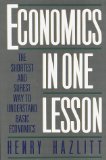 Henry Hazlitt’s Economics in One Lesson was also recommended by an economics instructor, I think as a counter-balance to the Keynesians I’d been reading. The book was originally written in 1946, and the version I read was updated in 1978. Even with the ’78 revision, I felt like I was in a town hall or a church meeting room, listening to Mr. Hazlitt at his pulpit. Writing style aside, here’s a direct quote from the end of the first section of the first chapter, which sums up the book nicely:
Henry Hazlitt’s Economics in One Lesson was also recommended by an economics instructor, I think as a counter-balance to the Keynesians I’d been reading. The book was originally written in 1946, and the version I read was updated in 1978. Even with the ’78 revision, I felt like I was in a town hall or a church meeting room, listening to Mr. Hazlitt at his pulpit. Writing style aside, here’s a direct quote from the end of the first section of the first chapter, which sums up the book nicely:
“From this aspect, therefore, the whole of economics can be reduced to a single lesson, and that lesson can be reduced to a single sentence. The art of economics consists in looking not merely at the immediate but at the longer effects of any act or policy; it consists in tracing the consequences of that policy not merely for one group but for all groups.“
Hazlitt then goes on through the rest of the book with example after example of how government interference with the market leads to an unfair market and an inefficient market. And how these conditions rob people of work, purchasing power, wages and/or dignity. Hewlitt is a believer in Classical Economics, and a staunch critic of the Keynesians. The book is broken up into short chapters with shorter sections, each of which describe the evil effects of government programs such as minimum wages, subsidies, tariffs, over-empowered unions (although Hazlitt does support the right for workers to organize), and many other federal and state market interventions. The book was like a tonic. It helped me think more critically about the Keynesian-based economics of the last several books I’d just finished. Of course, I’ve got a long way to go before I can weigh in on the Classical v. Keynesian debate, but I’m glad I read Hazlitt early on.

Leave a Reply